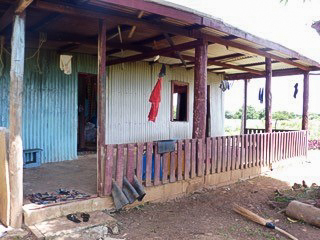Cyclone Winston, the most powerful storm ever recorded in the Southern Hemisphere, struck Fiji Saturday night killing 42 and trapping three St. Thomas students taking a vacation from their semester abroad in Gold Coast, Australia.
The storm, which was the equivalent to a Category 5 hurricane in wind strength and rain, made landfall on the students’ last night of their week-long trip to the islands. All flights off the main island, Viti Levu, were canceled, so junior Molly Street and sophomores Andrew Haugh and Hannah Rosentreter had to wait for the cyclone to pass.

“The trees were completely horizontal, and the rain was coming seemingly sideways. Once debris started flying past we immediately went inside. At one point the windows and front door to our room started shaking violently….The rain water started to force its way under the door and flood the floor,” Street wrote to TommieMedia in an email Tuesday.
Haugh said the group, which also included a student from the University of Miami, was not expecting the storm to be so violent.
“We had heard that there was a cyclone before (we left Australia), but we had also heard that it had passed,” Haugh said. “Then the day before we left, we heard that it was starting to turn around and that there was a chance that it could hit the main island of Viti Levu, but we were still determined to go no matter what.”
After a week of snorkeling, hiking and having fun on the islands of Fiji, the group realized the impending storm would be worse than they had anticipated.
The students booked hotel rooms Saturday night on the island of Viti Levu and bought extra food and water in case the storm caused massive destruction. Street said she fully realized the danger of the situation when she saw that locals were nervous.
“I honestly wasn’t worried until I saw the panic that others were in. The market (where) we were stocking up on supplies was a zoo. People were scrambling for everything. It really set in then that this was incredibly serious and that we didn’t have a choice – we had to stay on the island and go through it,” Street remembered.
The cyclone hit Fiji late Saturday night in full force, tearing off roofs, breaking windows, collapsing structures and flooding the streets.
“The storm hit really intensely between the hours of 11 p.m. and 3 a.m. I was too paranoid to sleep, always imagining a big gust of wind breaking the already-rattling window,” Rosentreter said.
The students woke up the next morning unscathed but without electricity. When they surveyed the damage at the hotel, they realized the end of the building opposite to theirs had been “completely submerged in water,” according to Haugh.
“Had our room been on the other side of the hotel, it would have been completely exposed to the wind,” Street said. “All of the rooms on the other side flooded with rainwater, and there were pieces of the roof laying all over. We were so fortunate to have been where we were.”
The students caught a return flight to Australia Monday, arriving safely back at their university by way of a connecting flight to Sydney. Rosentreter said her inconveniences with Wi-Fi and electricity paled in comparison to the thousands of island residents whose livelihoods were devastated in the storm.
“After spending a week in Fiji getting to see the beautiful culture, the vibrant happiness of the people and the small villages, my heart breaks knowing the destruction that the cyclone caused. My concerns … made me feel guilty and silly in comparison to the worries of the Fijian people,” Rosentreter said.
Street and Rosentreter emphasized that rebuilding the small nation’s infrastructure will take a lot of time and money, and that most impoverished Fijians already had so little.
“When it comes to natural disasters, people need to remember that the suffering doesn’t end when the news stops covering it. When something like this happens, people lose everything. The aid needs to keep coming and people need to keep caring long after the story has been taken off the ‘breaking news’ cycle,” Street said.
Sophie Carson can be reached at sophia.carson@stthomas.edu.
